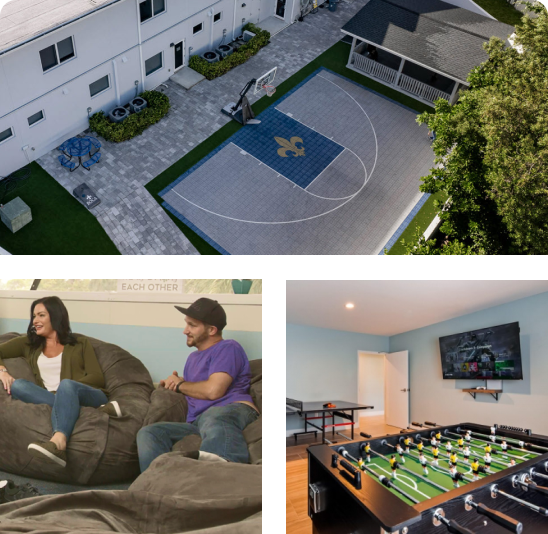Family Therapy
We often think of addictions as personal issues. In reality, one person’s substance use disorder can touch an entire family — changing relationships in complex and devastating ways. Family therapy at Boca Recovery Center untangles these complex connections and uses the power of a family’s love to promote health and healing. This science-based approach can help you build a stable life in recovery.





Family Therapy at Boca Recovery Center
Who can you lean on when times are tough? Who do you trust more than anyone else? For most people, the answer is family. But for people touched by substance abuse, family connections can be frayed or broken. Therapy at Boca Recovery Center can help.
At Boca Recovery Center, we are aware that treating a family is more challenging than treating an individual. Our staff is trained to manage complicated family situations with skill and compassion.
The family therapists at Boca Recovery Center can help your family recreate a stable, functional environment where your loved one can practice sustained abstinence. Our counselors are experienced in applying family therapy across various cultural and social situations.

What to Expect
Evaluation
Boca Recovery Center uses a tailored approach to SUD care. We’ll discuss your addiction, family history, and prior treatment approaches. Then, we’ll help you decide if including your family is an important part of your therapeutic plan.
Learning
You’ll learn how your SUD impacts — and might be supported by — family dynamics. Your close family members will learn how to help you practice new skills to stay sober for a lifetime. You’ll emerge as a stronger, healthy family unit.
Treatment
Family therapists who specialize in addiction rehab facilitate discussions and problem-solving sessions. These sessions may include the entire family or a subset of family members. Sometimes, the session involves someone other than the one using alcohol or drugs.
Benefits of Family Therapy
Family therapy allows you to address conflicts caused by addiction. It’s a safe, effective, and proven method to help people build a support group they can lean on in recovery.
These are some of the known benefits of family therapy:[1-3]
- Retention - When your family is deeply committed to your recovery and actively working with you, dropping out of care is harder and relapse may be less likely.
- Addiction understanding - Family therapy helps you recognize how your substance use changes your relationships and how you can solve long-standing problems.
- Family changes - Therapy helps your family make positive changes that strengthen your bond and make preserving your sobriety easier.
- Efficacy - Involving your family can strengthen your resolve to truly change your life.
What Patients Say

Boca Recovery is one of the best treatment centers in South Florida to address your substance use! As a clinical staff member, I can genuinely say that each therapist working here has your best interests at heart. We will work beside you to help guide you towards a successful recovery!
Britt

Boca recovery housing was very comfortable for the time I spent there. The apartment has two bedrooms fully furnished with kitchen appliances and all the necessary items to cook meals every day. It definitely allowed me to transition back to reality very easily as I was attending groups and AA meetings every day. I enjoyed using the gym and basketball they provided. I would recommend to anyone.
Erik

"Being the first client to go through Boca Recovery Center, I can honestly say it was the best decision of my life. I have never been in a facility where every person working there treats you as if you are their family and is there for you every step of the way. It was the most loving and caring facility I have ever attended."
Michael M.
Why Choose Us?
Proven Success in Addiction Care
We’ve helped over 6,000 patients fight and overcome their addiction and we truly understand the level of care needed to achieve long-term sobriety.
World-Class Treatment & Staff
We have some of the best medical directors that focus on creating customizable treatment plans to help patients overcome addiction
Top 10% of Rehabs in the U.S.
Our industry accreditations put us as the top 10% of rehabs in the U.S.
Flexible Payment Options
Frequently Asked Questions
Family therapy is an inclusive form of treatment that might include spouses, parents, children, and other people touched by one person’s SUD. Together, participants can resolve complex issues, develop clear methods of communication, and foster an environment that supports long-term sobriety.
Family therapy uses the inherent strength of families to bring about a change in dealing with a problem like substance abuse. The purpose of family therapy is twofold. The first is to reduce the impact of substance abuse on the individual with the addiction and the family. The second is to use the family’s resources and strengths to help the individual who dealing with an addiction.
Insurance companies cover therapy for substance abuse issues, but every plan is different. Some might restrict who can provide the care or how long it might last. Boca Recovery Center can navigate these issues for you, as we offer quick insurance verification. We can call your insurance company and get all the information you need.
Yes. The therapists at Boca Recovery Center specialize in family therapy and counseling with special training in drug rehab. If your family is in a crisis, talk to us today, and let us help you.
